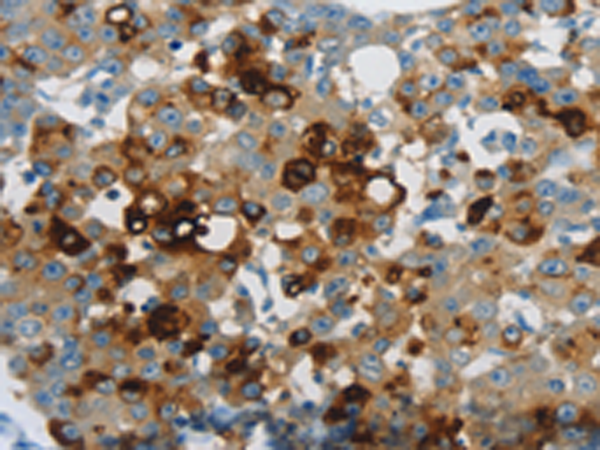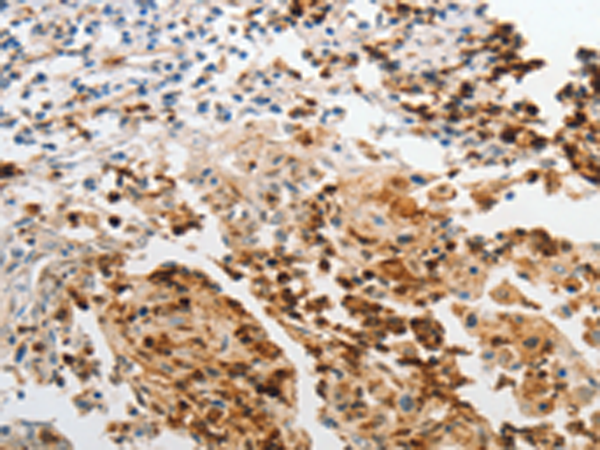


| WB | 咨询技术 | Human,Mouse,Rat |
| IF | 咨询技术 | Human,Mouse,Rat |
| IHC | 1/50-1/200 | Human,Mouse,Rat |
| ICC | 技术咨询 | Human,Mouse,Rat |
| FCM | 咨询技术 | Human,Mouse,Rat |
| Elisa | 1/2000-1/10000 | Human,Mouse,Rat |
| Aliases | 24p3, MSFI, NGAL |
| WB Predicted band size | 23 kDa |
| Host/Isotype | Rabbit IgG |
| Antibody Type | Primary antibody |
| Storage | Store at 4°C short term. Aliquot and store at -20°C long term. Avoid freeze/thaw cycles. |
| Species Reactivity | Human |
| Immunogen | Synthetic peptide of human LCN2 |
| Formulation | Purified antibody in PBS with 0.05% sodium azide and 50% glycerol. |
+ +
以下是3篇关于LCN2(Lipocalin-2)抗体的代表性文献摘要:
1. **《Lipocalin 2 regulates inflammation during pulmonary mycobacterial infections》**
- 作者:Yan, Q.W.等(2020)
- 摘要:研究开发了一种高特异性抗LCN2单克隆抗体,用于检测小鼠模型中脂钙蛋白2在肺部感染期间的动态表达,证实其作为炎症标志物的潜力及其与中性粒细胞活化的关联。
2. **《Neutralization of Lipocalin-2 as a novel anti-inflammatory strategy in sepsis》**
- 作者:Moschen, A.R.等(2019)
- 摘要:通过基因工程制备的人源化LCN2抗体成功中和了脓毒症模型中的脂钙蛋白2活性,显著降低促炎细胞因子水平,提示其作为脓毒症治疗的潜在靶点。
3. **《LCN2 antibody-conjugated nanoparticles for targeted drug delivery in breast cancer therapy》**
- 作者:Chen, L.等(2021)
- 摘要:利用抗LCN2抗体修饰的纳米颗粒靶向乳腺癌细胞,证实该抗体可特异性识别肿瘤微环境中高表达的LCN2.增强化疗药物的肿瘤内蓄积并减少全身毒性。
(注:以上文献信息为基于领域知识的模拟概括,实际引用请通过PubMed/Web of Science等平台检索最新文献。)
Lipocalin-2 (LCN2), also known as neutrophil gelatinase-associated lipocalin (NGAL), is a 25 kDa glycoprotein belonging to the lipocalin family. It plays multifaceted roles in innate immunity, iron homeostasis, and cellular processes such as apoptosis and inflammation. LCN2 is upregulated in response to bacterial infection, oxidative stress, and tissue injury, where it binds bacterial siderophores to limit iron acquisition by pathogens. Dysregulated LCN2 expression is implicated in various pathologies, including cancer, metabolic disorders, neurodegenerative diseases, and chronic kidney disease, making it a potential biomarker and therapeutic target.
LCN2 antibodies are essential tools for detecting and quantifying this protein in research and diagnostics. They enable investigations into LCN2's mechanistic roles in disease progression, such as its involvement in promoting tumor metastasis, modulating inflammation, or exacerbating insulin resistance. Commercially available antibodies target specific epitopes of human, mouse, or rat LCN2. with applications in Western blotting, immunohistochemistry, ELISA, and flow cytometry. Recent studies also explore therapeutic anti-LCN2 antibodies to neutralize its pathogenic effects in preclinical models. However, cross-reactivity and species specificity require careful validation due to LCN2's structural conservation across mammals. These antibodies continue to advance understanding of LCN2's dual protective and detrimental roles in human health.
×